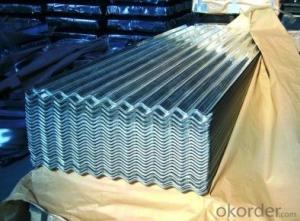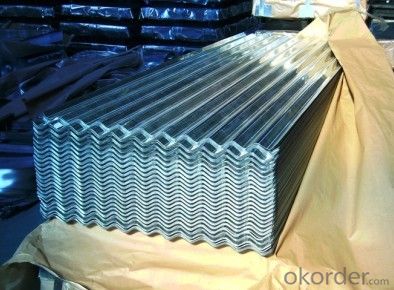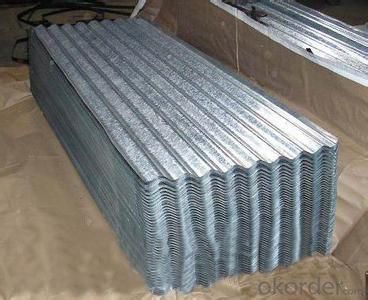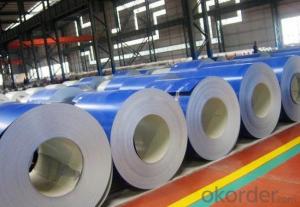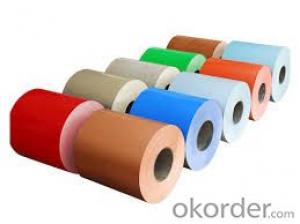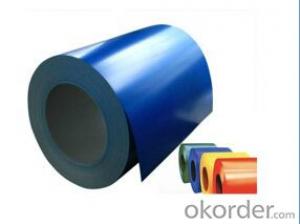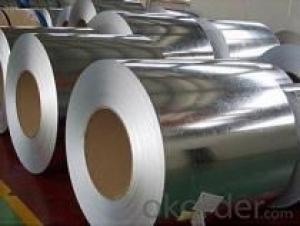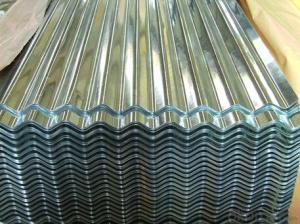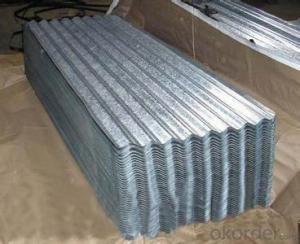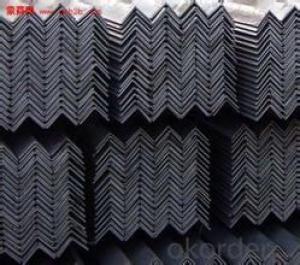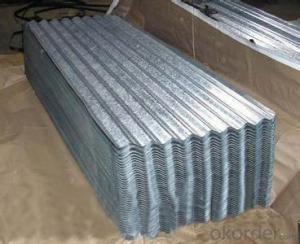Hot-Dip Galvanized Steel Roof with Best Price
- Loading Port:
- Tianjin
- Payment Terms:
- TT OR LC
- Min Order Qty:
- 50 m.t.
- Supply Capability:
- 10000 m.t./month
OKorder Service Pledge
OKorder Financial Service
You Might Also Like
1. Hot-Dip Galvanized Steel Roof Description:
Hot-dip galvanized steel roof are available with a pure zinc coating through the hot-dip galvanizing process. It offers the economy, strength and formability of steel combined with the corrosion resistance of zinc. The hot-dip process is the process by which steel gets coated in layers of zinc to protect against rust. It is especially useful for countless outdoor and industrial application.
2.Main Features of the Hot-Dip Galvanized Steel Roof:
• Excellent process capability
• Smooth and flat surface
• Workability, durability
• Excellent heat resistance performance
• High strength
• Good formability
• Good visual effect
3.Hot-Dip Galvanized Steel Roof Images
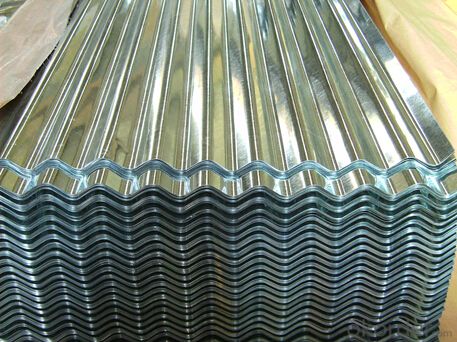
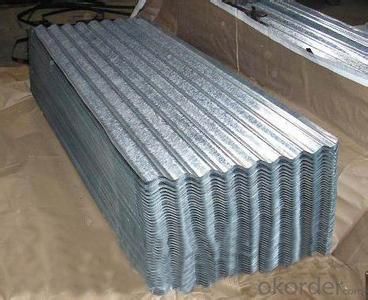
4.Hot-Dip Galvanized Steel Roof Specification
Material: Galvanized Sheet
Width: 650/800/890/900
Length: 1500/1800/2000/2400/3005/3600 or customized
Thickness: 0.2-2.0
Surface Treatment: Hot dipped/Bended
Application: warehouse; shelter; Commercial facilities; industrial facilities
5.FAQ of Hot-Dip Galvanized Steel Roof
Which payment term we can do?
L/C at sight or T/T.
What’s the basic material of this product?
Galvanized/Aluzinc Steel
- Q: The highest quality i have seen is 9260 and i want to know if there is a higher quality steel.
- Types of steel are one issue. But the quality of steel no matter what type is even more important. The only way to be sure that you are getting a good blade is to buy from someone that already has a reputation for producing great blades. Stop the questions about who thinks what type of steel is best and investigate the steel blades offered by companies like Bugei Trading company. they have good blades. Opinions vary, but Bugei has proven that they make good swords. That is all that is needed to be known. Any questions you have are best directed to them, not here.
- Q: How are steel coils processed for painting or coating?
- Steel coils are typically processed for painting or coating through a series of steps. First, the coils are cleaned to remove any dirt, oil, or rust. This is usually done through a chemical cleaning process or by using mechanical methods such as shot blasting. Next, the coils are pre-treated to enhance adhesion and corrosion resistance. This can involve applying a conversion coating or a primer. Finally, the coils are painted or coated using a variety of methods such as roll coating, spray coating, or electrostatic coating. The specific process depends on the desired finish and application requirements.
- Q: What are the different methods of uncoiling steel coils?
- Uncoiling steel coils can be done in several ways, depending on the specific requirements and available equipment. Some commonly used methods are: 1. Manual uncoiling: This method involves manually unwinding the coil using a bar or rod inserted through the inner diameter. It is suitable for smaller coils or when other methods are not accessible. 2. Mandrel uncoiling: A mandrel, a cylindrical tool, supports the inner diameter of the coil and enables free rotation. The coil is placed on the mandrel and rotated to unwind the steel. 3. Decoiler machine uncoiling: Designed specifically for uncoiling steel coils, these machines consist of a mandrel or drum to hold the coil. They also include a motorized mechanism to control the speed of unwinding. Decoilers are suitable for larger and heavier coils, making them ideal for industrial applications. 4. Straightener-feeder uncoiling: This method is utilized when the steel coil needs to be straightened and fed into a production line simultaneously. The coil passes through straightening rollers to remove any curvature before being fed into the subsequent processing equipment. 5. Recoiler uncoiling: Recoilers are used when the steel coil needs to be rewound into a new coil. The original coil is uncoiled using one of the previously mentioned methods, and then the steel is rewound onto a new mandrel or drum to create a smaller coil. It is important to consider factors such as the size and weight of the coil, desired level of automation, and specific production requirements when choosing an uncoiling method.
- Q: How are steel coils used in the production of steel hooks?
- Steel coils are used in the production of steel hooks as they provide the raw material needed for shaping, forming, and manufacturing the hooks. The coils are unwound, processed, and then transformed into the desired shape and size to create the steel hooks.
- Q: How do steel coils contribute to the automotive manufacturing sector?
- Steel coils are essential in the automotive manufacturing sector as they are used to produce various components such as body parts, frames, and suspension systems. The high strength and durability of steel coils make them ideal for ensuring the safety and structural integrity of vehicles. Additionally, steel coils are easily moldable, allowing manufacturers to create complex shapes and designs, contributing to the overall aesthetics and functionality of automobiles.
- Q: ok I got a dpms ar 15 and all i have put though it is good brass 223 ammo but is it ok to shoot the old crappy steel cased wolf ammo out of it will it hurt its function or will it hurt it cosmetically?
- Overall it's dirtier. In this age however it's also cheaper. So if you need to stock up. In case. It's still a good option. Fire your brass first.
- Q: How much should someone sell a 6 ft stainless steel counter? How about one with a sink?
- Ask for the best offer on OKorder and find out.
- Q: For example, (and this is weird) if I were wearing a steel collar and I needed some way to remove it, with limited supplies.Force is difficult because it would be around my neck.Chemical cominations are great- but they have to use VERY common products. And I'm not sure what to use.Other ideas?
- There are plenty of ways to damage/weaken steel... shear or tensile force, fatigue, temperature, corrosion, grinding, etc... there are even dozens of ways to do each of the things I just listed. But in the case you suggested, with the steel being very close to skin... a simple pair of bolt cutters would probably be the easiest.
- Q: I downloaded broken steel, the notice of my level cap raising was shown, but after reaching the Jefferson Memorial (when you are supposed to activate the purifier) if I kill Colonel Autumn, then Lyons simply says that we must secure the area, and I can't complete the mission. If I let Autumn live, then she gets stuck in a loop saying Steel be with you over and over. Has anyone else experienced this/how can I fix this? I paid $10 for the expansion and I'm getting ripped off.
- for my area i've got in no way stricken with achievements. Hell, i've got in no way logged into domicile windows stay in six months for the reason that this game got here out. i do no longer even have the disk in my laptop. I merely launch by FOMM and FOSE. you already know what achievements i like, making mods. human beings love a number of my mods, and to me this is a real success. the sport is merely game, enjoying it would not recommend something, this is different from you lived in SE Asia for 6 months in a shack with out working water with a warm distant places female you met on line and then introduced her and your toddler back to stay inclusive of your mom, no, you haven't any longer achieved something different than to be entertained by skill of somebody else's success. Oh, specific you have solved some mysteries, explored some areas and located some issues that have been hidden, yet you likely regarded up on line the places for lots of the stuff you discovered besides. Oh, and to respond to your question: Bethesda's engaged on it, alongside with fixing the a million.5 replace that kills mods with outdoors adjustments by skill of making the sport crash on shop.
- Q: What are the common transportation defects in steel coils?
- There are several common transportation defects that can occur in steel coils. One of the most common is coil damage caused by improper handling or securing during transportation. This can result in dents, scratches, or even tears in the steel. Another common defect is coil edge damage, which can occur if the coils are not properly protected or if they rub against each other during transit. This can lead to deformation or even breakage of the coil edges. Additionally, coil shifting is another common defect, which happens when the coils are not properly secured or braced, causing them to move and shift during transportation. This can result in misalignment or damage to the coils. Finally, coil corrosion is a common defect that can occur if the coils are exposed to moisture or other corrosive elements during transportation. This can lead to rust and deterioration of the steel. Overall, proper handling, securing, and protection measures are crucial in order to prevent these common transportation defects in steel coils.
Send your message to us
Hot-Dip Galvanized Steel Roof with Best Price
- Loading Port:
- Tianjin
- Payment Terms:
- TT OR LC
- Min Order Qty:
- 50 m.t.
- Supply Capability:
- 10000 m.t./month
OKorder Service Pledge
OKorder Financial Service
Similar products
Hot products
Hot Searches
Related keywords
